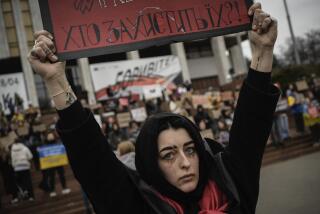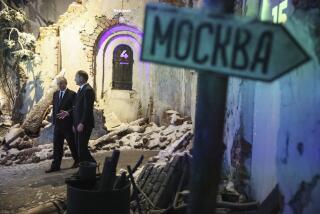Better Fallout Warning Needed, Soviets Agree
- Share via
WARSAW — Soviet nuclear experts, in talks with Polish officials, have agreed that there is a need to improve international warning procedures in the wake of the Chernobyl reactor accident, Poland’s government spokesman said Tuesday.
The spokesman, Jerzy Urban, said Soviet and Polish officials both see a need to “precisely determine what was not precise enough before,” specifically, “at what level of contamination” from a nuclear accident one nation should be required to notify another of a potential hazard.
Working out precise criteria for issuing formal warnings would require “much time and effort,” Urban said in response to questions from Western journalists at his regular weekly news conference.
Hint of Unhappiness
This was as close as any Soviet ally has come to voicing dissatisfaction with Moscow’s two-day delay in issuing its first public admission of the Chernobyl accident, which has since spread measurable radioactive contamination over a large part of the Northern Hemisphere.
An explosion and fire shattered the graphite reactor on April 26, but it was not until late on April 28 that the Tass news agency disclosed that a major nuclear accident had occurred in the Ukraine. It did so only after the fallout triggered radiation alarms in Sweden and Finland 1,000 miles to the north and the Swedish government pressed Moscow for an explanation.
The Soviet Union’s East European allies have been quick to join it in criticizing Western news coverage of the accident, but they have scrupulously avoided criticizing Moscow’s handling of the accident itself. Urban, for example, accused American-sponsored Radio Free Europe of trying to incite panic in Poland with alarmist reports of high radiation.
Yugoslavia Blames Moscow
Yugoslavia, a nonaligned Communist country outside the Soviet Bloc, has been a notable exception. As fallout waned on Monday, the Zagreb daily Vecernji List said Moscow had only itself to blame for any flaws in Western reporting.
Speaking of the “negative political effects” of the disaster, the newspaper said “the Soviet Union itself provided arguments for criticism by drawing a veil of secrecy over the accident.”
Czechoslovakia, by contrast, echoed Soviet charges that the West was trying to exploit the disaster to divert attention from Soviet peace proposals. The Czech press has published almost no information about the accident, but the leading official newspaper, Rude Pravo, declared that “the friends of the Soviet Union stand at these moments by its side.”
Detrimental Winds
With its nearest border only 280 miles northwest of Chernobyl, Poland is the closest neighboring country downwind from the smoldering Chernobyl reactor. At the time of the accident, Urban noted, “weather conditions were very detrimental to Poland” as prevailing winds blew the contamination “mostly in our direction.”
The Polish news agency PAP reported on Monday that a delegation of Soviet experts on radiological protection met with Deputy Premier Zbigniew Szalajda, the head of a special government commission monitoring the Chernobyl fallout in Poland.
“Both sides drew conclusions from this experience,” Urban said, adding: “We should have safety standards . . . to say at what level (of contamination) the parties will inform each other.”
Vague on Timing
Urban continued to avoid direct answers to questions about when Poland actually learned of the accident. There have been indications that Polish authorities were aware of a possible radiation threat as early as the night of April 26, two days before Moscow acknowledged the accident, and used the time to prepare for the mass distribution of iodine without passing the warning on to other countries.
“I reiterate that we have been in constant contact with Soviet specialists concerning the entire matter,” Urban said.
Asked whether Poland will ask compensation from the Soviet Union, he implied that economic losses and the cost of distributing 10 million doses of iodine to children are too small to justify such a request. “Losses to Poland would not be significant,” he said.
Compensation Mentioned
On Sunday, Soviet foreign affairs specialist Georgy A. Arbatov told the British Broadcasting Corp., in response to a question, that the Soviet Union would be willing to compensate Poland for any losses. Arbatov did not mention any other country.
Told that the 12 European Communities nations are considering an indefinite ban on food imports from Poland and five other East European countries, Urban said, “I cannot imagine a rational basis” for such an action. But he added that if such a ban is imposed, it will only result in delays in shipments of foodstuffs, not in export losses.
Poland depends partly on food exports for the foreign exchange it needs to service its $31-billion debt to Western creditors.
(In New Canaan, Conn., a private relief agency known as the Americares Foundation announced Tuesday that it is sending food and medicine to Poland. A spokesman for the group said that in response to an appeal from church leaders in Poland, a chartered Boeing 747 will leave New York on Friday with 240,000 pounds of supplies, including dried milk products and vitamin tablets. Additional such “mercy lifts” are planned, he said.)
Radiation Discounted
As for the Polish population’s exposure to radiation, Urban repeated the government’s contention that “at no time did radiation ever approach a threat to human health at any point in Poland.”
Dr. Andrzej Rodowicz, the deputy chairman of the State Nuclear Energy Agency, said the average accumulated dose between April 28 and May 2 in the Polish population was 25 millirems, about the same as a chest X-ray.
Rodowicz also said the intensity of radiation ranged from 0.02 millirems per hour to 0.45 millirems per hour, figures that correspond to 1.4 to 30 times the natural background level. However, these appeared to be averages that did not reflect the maximums recorded in isolated areas of northeast Poland, where officials said earlier that radiation registered as high as 500 times the natural background.
Pressed to disclose maximum doses absorbed over the same four-day period, Rodowicz said the government will not publish more detailed data. “There was no need for such analysis,” he said, because no one’s health was endangered.
More to Read
Sign up for Essential California
The most important California stories and recommendations in your inbox every morning.
You may occasionally receive promotional content from the Los Angeles Times.













